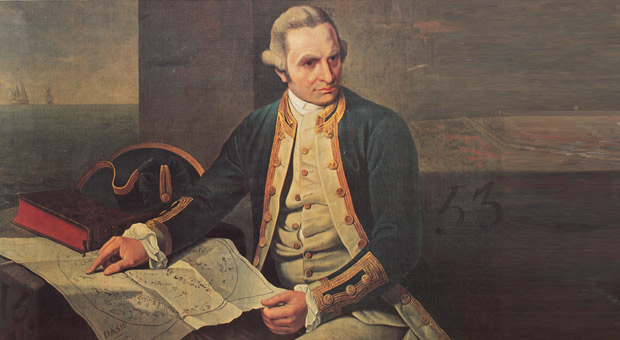He was standing at the water’s edge facing advancing Hawaiian warriors. Unfortunately, at that crucial moment, some of his men started shooting from the boats. As he turned to stop his men from firing, he was fatally stabbed and fell face-first in the water.
This is the story of James Cook’s death. The nation of England mourned the loss of the man many considered to be the greatest combination of seaman, explorer, navigator and cartographer (mapmaker) the world had ever known.
What was it that led to this sad death?
Cook and the seamen under him had first met the Hawaiian warriors in an atmosphere of friendliness and welcome. However, this broke down after a series of thefts from the British stores. Tensions came to a head when one of the cutters (small boats) belonging to Cook’s expedition was stolen.
The next morning Cook, his Lieutenant and nine marines went ashore. They intended to take the Hawaiian King hostage until the warriors returned the boat. But in the resulting confrontations and confusion, Cook’s men started firing and killed a high-ranking chief. At that point, the crowds on the shore responded angrily. As Cook and the marines turned to their boats, they were attacked. Cook was killed.
This was James Cook’s third journey of exploration for the Admiralty of the British Royal Navy. It had been ‘a daring feat of navigational engineering’, searching for a north-west passage between the Pacific and Atlantic oceans.
Cook’s father was a farm labourer who encouraged his son to work hard. Young James Cook ran errands and helped with the farm chores to pay for his education. He became physically strong, which would later suit the rugged life of a seaman. He was good at mathematics and showed an early interest in navigation and astronomy. These qualities were important and helpful for the vital role God had planned for him.
James Cook completed an apprenticeship with a ship-builder in Whitby, a coastal village in England. He spent three years there with the Walker family, who were people with strong Christian faith. He met and married a woman who was also a devoted Christian. When he was only twenty-seven years of age, he was offered the command of a ship.
The official purpose of the first of Cook’s voyages in the Pacific was to observe, from Tahiti, an important event in the world of astronomy: the transit of Venus. But Cook was also secretly instructed to search for a ‘new’ continent. The British were aware that the French were also actively looking for new lands that might make them a lot of money. The two nations were in fierce competition to find those lands first.
Before he set out on his first voyage, Cook’s wife gave him an Anglican Prayer Book, which he used for the Sunday church services on board his ship, the Endeavour. This book inspired him to name many of the places he discovered during his voyage after important times in the Christian church calendar, such as the Whitsunday Islands, Trinity Bay, Christmas Island and Pentecost Island.
But more importantly, the prayer book guided his behaviour and attitudes. Cook was a man of high morals. He would allow no profanity (swearing or other rude talk) on his ship.
On 6 May 1770, Cook landed at Botany Bay just south of Sydney. The positive report about this great continent with which he returned to Britain laid the groundwork for the First Fleet to arrive some eighteen years later, beginning the European colonisation of Australia.
James Cook’s discovery of Australia paved the way for the English to bring the gospel message of God’s love for all of humanity to Australia.
A book telling the story of Cook’s voyages, published within a few years of his death, also inspired William Carey, a young Englishman, to travel. As he read about the many groups of people who had never heard of Jesus, William was moved. He decided that he would go and tell people the good news about Jesus, and he set out to take the gospel to India. In this way, the modern missionary movement began.
Captain James Cook allowed God’s word to influence his life and behaviour as a brave explorer and as a leader. As a result of his travels and the way he inspired others like William Carey, many nations heard the gospel.
Written by Elizabeth Kotlowski.
Further reading:
Elizabeth Kotlowski is the author of Stories of Australia’s Christian Heritage, Strand Publishing Co, 2006.

